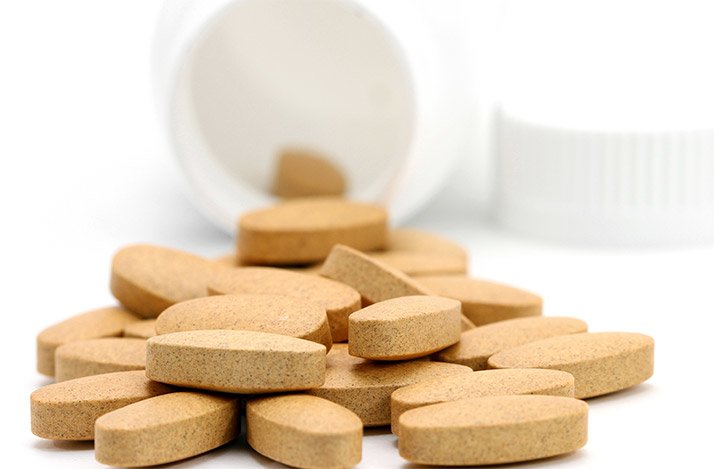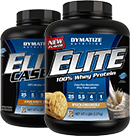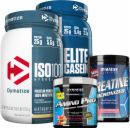
4 Essential Nighttime Nutrients
Savvy athletes have known for years that smart nutrition at bedtime is better than none at all. Boost your overnight protein production and sleep better with these 4 proven ingredients!
Nighttime nutrition is rapidly shaping up to be the next major frontier of sport nutrition. While we sleep, the digestion of foods and absorption of key nutrients are virtually the same as when we are awake. Furthermore, while our minds doze, our muscles remain responsive to muscle-building (anabolic) signaling nutrients like protein and amino acids, especially leucine.
This realization opens up a 6- to 9-hour potential bonanza of growth and nourishment that has long been overlooked by many. The exception: bodybuilders and hardcore weightlifters have been dialed in on nocturnal nutrition for decades. We're all familiar with the image of someone knocking back one last protein meal or shake before bed, or setting their alarm clock for the middle of the night to down the protein shake awaiting them on their bedside table.
On the other hand, for most people exposed to mainstream TV programs, popular diets, and celebrity recommendations, the general guidance has been to not eat anything after 7 p.m. Clearly, the endgame is different, as most people are trying to reduce their physique, rather than build it. But the smart transformer knows that improving body composition requires adding muscle, not just burning fat.
So let's put the "don't eat anything" idea to bed once and for all, and replace it with something more useful. Prioritize these nutrients prior to bedtime!
What's So Special About Nighttime?
As I mentioned, much of what happens in your body at night is the same as what happens during the day. But the wee hours do have several unique and interesting occurrences, particularly in regard to hormones.
The anabolic hormone known as growth hormone, or GH, increases early in sleep, but then wanes throughout the night. Many additional factors influence growth-hormone release, including strenuous training, other hormones, and yes, certain dietary factors. Conversely, levels of the catabolic (muscle-wasting) hormone cortisol begin to creep up in the middle of the night and stay elevated into the morning hours. Come morning, cortisol has the edge, putting you in a net catabolic environment throughout the night.

Nighttime muscle protein breakdown (MPB) causes you to start the day in a muscle-building deficit that must first be recovered prior to making net gains during the rest of the day. But the upside is that strategic nighttime nutrition has been shown to help counteract cortisol's effects.
The key benefits associated with nighttime nutrition include:
- Extension of muscle protein synthesis (MPS) into the nighttime hours
- Minimization of MPB during sleep
- Increased calorie burning at night
- Potential reduction of morning hunger or breakfast cravings
- Enhanced recovery from training sessions, particularly for people training later in the previous day
Nighttime Nutrient 1 Protein
No surprise here! Not only is protein efficiently digested and absorbed during sleep, its ability to evoke MPS is on par with waking hours.1-3 Combined with weight training, protein intake right before bed can provide an additional leverage point to optimize gains in muscle mass and strength, especially when training occurs later in the day, when the post-workout period and sleep overlap.4
Furthermore, consuming whey or casein before bed also influences morning metabolism. One study found that 30 grams of either type of protein was sufficient to raise subjects' resting metabolic rate 3.5 percent the following morning.5 This is important because it indicates that the calories you take in at bedtime or overnight are more likely to end up being used in MPS, or muscle gain, rather than fat gain. In addition, nighttime casein might help manage the intensity of hunger early in the morning.6

Casein has long been the go-to nighttime protein based on its slow digestion and absorption properties. Amino acids from 25-30 grams of casein may still be entering the blood and influencing MPS five hours after you take them.7,8 Furthermore, casein's long action might hold an advantage during overnight timing to help to minimize MPB.8
So how about that glass of warm (or cold) milk before bed? Sure, milk is 80 percent casein, but it will take three cups to get you to 25-30 grams of casein, and you will have to contend with the extra lactose carbohydrate. Cottage cheese, on the other hand, is all casein protein, and one cup will provide roughly 25 grams of protein. It's a better choice at night than milk, although you'll still have to contend with some lactose content.
Why is lactose a concern? The extra carbohydrates from a glass of milk could affect the fine balance that exists between "enough insulin to help keep MPB at bay," and "enough insulin to impede fat breakdown."5 Keep carbs relatively low here, and focus on protein and possibly some healthy fats.
For those of you with a sweet tooth, try out this delicious protein chai latte. It's a perfect way to end your day, plus it's packed with 26 grams of casein to help stave off muscle breakdown while you sleep.
Recommendations: 25-30 grams of casein protein within 30 minutes of going to bed. A lower level of casein can be used if combined with BCAAs, EAAs, or hydrolyzed whey.
Nighttime Nutrient 2 Tryptophan
Tryptophan is an essential amino acid for protein production, but more importantly, it serves as a precursor for the rest-inducing hormones serotonin and melatonin. Food sources of tryptophan include elk meat, seaweed, spinach, and sesame seeds.9 Dietary supplementation of tryptophan—the only serotonin precursor—is known to stimulate serotonin-related activity and promote sleep.10
Although initial studies showing tryptophan supplementation could improve sleep occurred decades ago, this view remains intact.11-16 In such studies, various levels of tryptophan have been used, but the lowest level shown to provide benefit is 1-2 grams. That's a pretty tough amount to get from food, which is why supplementing can be helpful.
In order for tryptophan to be converted to serotonin, it must cross the blood-brain barrier via a transporter that also transports BCAAs. A little bit of presleep carbohydrate can raise insulin and help BCAA delivery into the muscles, thereby reducing the transporter competition for tryptophan. The result? A subsequent drowsiness similar to the feeling after a large Thanksgiving meal or a warm glass of milk.
Recommendation: 1 gram of L-tryptophan taken 30 minutes before sleep.
Nighttime Nutrient 3 Magnesium
Magnesium is an essential mineral that plays many roles in the body. But to our point here, a number of studies—especially with older individuals—suggest that magnesium can improve both sleep time and perceived quality of sleep.16
Magnesium supplementation close to bed has been noted to improve brain activity readings associated with deep sleep, and lower late-night cortisol levels in older individuals.17 When it comes to deep, restful sleep, magnesium seems to play a key role in the function of GABA (gamma-amino-butyric acid) receptors. GABA is a calming neurotransmitter that is believed to help take the edge off the day and support drifting off to sleep.
Recommendation: 500 milligrams of magnesium taken 30-60 minutes before bed.
Nighttime nutrient 4 Zinc
Like magnesium, zinc is an essential mineral that serves many roles in the body. One major function of zinc is its principal involvement in the production of growth hormone and related hormone insulin-like growth factor (IGF).18,19

This has led to the belief that zinc supplementation, either alone or in combination with other nutrients such as magnesium and aspartic acid, may create a more optimal hormonal profile for muscle growth in response to training. This effect remains unproven in healthy people who eat well and train hard.20, 21
What's clearer is that zinc, particularly in combination with magnesium and possibly melatonin, can help promote better sleep, particularly for people who struggle with insomnia.22 Remember: Getting enough quality sleep is a critical component of any training program, as it supports vitality and strength during your workout the ensuing day. Without that, even the best diet and supplementation plan cannot overcome poor workouts.
Recommendation: 10-15 milligrams of zinc taken 30-60 minutes before bed. Zinc can be taken with protein, amino acids, and other minerals such as magnesium.
References
- Groen, B., Pennings, B. A. R. T., Beelen, M., Wallis, G. A., Gijsen, A. P., Senden, J. M., & Van Loon, L. J. (2012). Protein ingestion before sleep improves postexercise overnight recovery. Medicine and Science in Sports and Exercise, 44(8), 1560-1569.
- Groen, B. B., Pennings, B., Hertle, E., Senden, J. M., Saris, W. H., & van Loon, L. J. (2012). Intragastric protein administration stimulates overnight muscle protein synthesis in elderly men. American Journal of Physiology-Endocrinology and Metabolism, 302(1), E52-E60.
- Kinsey, A. W., & Ormsbee, M. J. (2015). The Health Impact of Nighttime Eating: Old and New Perspectives. Nutrients, 7(4), 2648-2662.
- Snijders, T., Smeets, J. S., van Vliet, S., van Kranenburg, J., Maase, K., Kies, A. K., ... & van Loon, L. J. (2015). Protein Ingestion before Sleep Increases Muscle Mass and Strength Gains during Prolonged Resistance-Type Exercise Training in Healthy Young Men. The Journal of Nutrition, jn208371.
- Madzima, T. A., Panton, L. B., Fretti, S. K., Kinsey, A. W., & Ormsbee, M. J. (2014). Night-time consumption of protein or carbohydrate results in increased morning resting energy expenditure in active college-aged men. British Journal of Nutrition, 111(01), 71-77.
- Ormsbee, M. J., Kinsey, A. W., Eddy, W. R., Madzima, T. A., Arciero, P. J., Figueroa, A., & Panton, L. B. (2014). The influence of nighttime feeding of carbohydrate or protein combined with exercise training on appetite and cardiometabolic risk in young obese women. Applied Physiology, Nutrition, and Metabolism, 40(1), 37-45.
- Dangin, M., Boirie, Y., Guillet, C., & Beaufrère, B. (2002). Influence of the protein digestion rate on protein turnover in young and elderly subjects. The Journal of Nutrition, 132(10), 3228S-3233S.
- Boirie, Y., Dangin, M., Gachon, P., Vasson, M. P., Maubois, J. L., & Beaufrère, B. (1997). Slow and fast dietary proteins differently modulate postprandial protein accretion. Proceedings of the National Academy of Sciences, 94(26), 14930-14935.
- USDA National Nutrient Database for Standard Reference. Tryptophan. (2015, October 1). Retrieved from http://www.ars.usda.gov/Services/docs.htm?docid=8964.
- Melancon, M. O., Lorrain, D., & Dionne, I. J. (2014). Exercise and sleep in aging: emphasis on serotonin. Pathologie Biologie, 62(5), 276-283.
- Fernstrom, J. D. (2012). Effects and side effects associated with the non-nutritional use of tryptophan by humans. The Journal of Nutrition, jn-111.
- Wyatt, R., Kupfer, D., Sjoerdsma, A., Engelman, K., Fram, D., & Snyder, F. (1970). Effects of L-tryptophan (a natural sedative) on human sleep. The Lancet, 296(7678), 842-846.
- Griffiths, W. J., Lester, B. K., Coulter, J. D., & Williams, H. L. (1972). Tryptophan and sleep in young adults. Psychophysiology, 9(3), 345-356.
- Schneider-Helmert, D. (1980). Interval therapy with L-tryptophan in severe chronic insomniacs. A predictive laboratory study. International Pharmacopsychiatry, 16(3), 162-173.
- Hartmann, E., & Cravens, J. (1974). Hypnotic effects of L-tryptophan. Archives of General Psychiatry, 31(3), 394-397.
- Schneider-Helmert, D., & Bodmer, M. (1983). Definitive recovery from chronic severe insomnia by long term interval therapy with L-tryptophan. Sleep Research, 12, 393.
- Held, K., Antonijevic, I. A., Künzel, H., Uhr, M., Wetter, T. C., Golly, I. C., ... & Murck, H. (2002). Oral Mg (2+) supplementation reverses age-related neuroendocrine and sleep EEG changes in humans. Pharmacopsychiatry, 35(4), 135-143.
- Hamza, R. T., Hamed, A. I., & Sallam, M. T. (2012). Effect of zinc supplementation on growth hormone-insulin growth factor axis in short Egyptian children with zinc deficiency. Italian Journal of Pediatrics, 38(1), 21.
- MacDonald, R. S. (2000). The role of zinc in growth and cell proliferation. The Journal of Nutrition, 130(5), 1500S-1508S.
- Wilborn, C. D., Kerksick, C. M., Campbell, B. I., Taylor, L. W., Marcello, B. M., Rasmussen, C. J., ... & Kreider, R. B. (2004). Effects of zinc magnesium aspartate (ZMA) supplementation on training adaptations and markers of anabolism and catabolism. Journal of the International Society of Sports Nutrition, 1(2), 12-20.
- Koehler, K., Parr, M. K., Geyer, H., Mester, J., & Schänzer, W. (2009). Serum testosterone and urinary excretion of steroid hormone metabolites after administration of a high-dose zinc supplement. European Journal of Clinical Nutrition, 63(1), 65-70.
- Rondanelli, M., Opizzi, A., Monteferrario, F., Antoniello, N., Manni, R., & Klersy, C. (2011). The Effect of Melatonin, Magnesium, and Zinc on Primary Insomnia in Long-Term Care Facility Residents in Italy: A Double-Blind, Placebo-Controlled Clinical Trial. Journal of the American Geriatrics Society, 59(1), 82-90.




